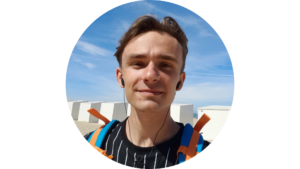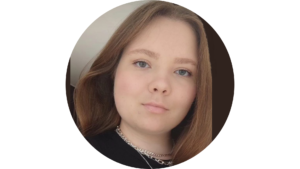⬇️ belarusian version below

OPINION
by
Usevalad Lahun
2nd year student of the European Humanities University and Kaunas Vytautas Magnus University, World Politics and Economy
Summer University 2022
3_rd day (August 3_rd )
On this day we talked about the earliest group of rights that appeared before society – personal/civil rights and their transformation today.
First, the lecture was conducted by Riccardo Vecellio Segate, who analyzed how a separate group of rights came out of personal space. I especially liked how he distinguished personal and collective freedoms on the example of China, in the
autonomous region of which he teaches (Macau), through the introduction of digitalization and its protective and punishable tools. It was interesting to see how much Western legal systems have adopted the Chinese experience.
Andrew Sushko was next. He spoke about working with the Eastern European region and about the imperfection of norms.- the legal framework in these countries, after all, the same Belarus rather ineffectively protects new information rights, as well
as the rights to their security. The lecturer suggested that the next step would be to assess the situation in Belarus from this side and suggest which system would be better implemented (western or eastern). Next, we analyzed real cases during group
projects.
Natalia Mikhailava, a teacher from EHU, finished the session day. She told how propaganda transformed with the formation of the digital society. This happens through mass surveillance technologies, biometric monitoring and psychometric placement not only during elections, but also during the exercise of political power. In the time allotted after the speech, interesting questions were asked. To one of them, about positive and negative propaganda, the lecturer corresponded rather ambiguously
that, for example, the propaganda of eco-movement and nature protection can be aggressive and use the same methods as conventional propaganda. Moderator Axana Troneva agreed with her, adding that anti-propaganda is also propaganda, albeit with good intentions, so its use should not be allowed.

OPINION
by Ulyana Belaya
2nd year student of the European Humanities University,
International Law and EU law
Summer University 2022
3_rd day (August 3_rd )
The topic that was woven through all the lectures of the third day was the difference between East and West. And, in particular, eastern patterns of privacy violation.
At first it was delivered by Riccardo Vecellio Segate, who has his own experience of working and teaching in Asia. Therefore, not only was his overview on eastern understanding of technology regulation full-covered, but also based on his personal background. Since the lecture was comparing western and eastern approach, it was interesting for me to connect it with Belarus and think on which way our country could choose.
Those dots were joined by the following lecturer, Andrew Sushko. He, as a lawyer who is mostly working with Belarus and the region, stated uncertainty of our country in regulating both technologies and human rights. Then he offered the participants to discuss, what problems Belarus is facing and how they could be solved. According to the lecturer, we can follow eastern (Chinese) and western (Estonian) paths, and both of them have their pros and cons. We also worked in the small groups, discussing real cases on the related topic.
Finally, eastern cases of human right abuse and propaganda were reviewed by the last lecturer, Natalya Mikhailova. I liked the fact that she managed to show propaganda from media point of view, but enforced it with legal descriptions of real cases.

МЕРКАВАННЕ
Аўтар: Усевалад Лагун
студэнт 2 курса Еўрапейскага гуманітарнага ўніверсітэта і Каўнаскага універсітэта імя Вітаўта Вялікага, Сусветная палітыка і эканоміка
Летні універсітэт 2022.
3 дзень (3 жніўня).
У гэты дзень мы размаўлялі пра самую ранюю груп правоў, якая паўстала перад грамадствам,– асабістыя/грамадзянскія правы і іх трансфармацыю сёння.
Спачатку лекцыю правёў Рыкарда Вечэліа Сегатэ, які разабраў, як з асабістай прасторы выйшла асобная група правоў. Асабліва мне спадабалася, як ён размежаваў асабістыя і калектыўныя свабоды на прыкладзе Кітая, у аўтаномным раёне якога ён выкладае (Макао), праз унядрэнне дыджыталізацыі і яе ахоўна-каральных інструментаў. Было цікава прасачыць наколькі заходнія прававыя сістэмы перанялі кітайскі досвед.
Наступным быў Андрэй Сушко. Ён распавёў пра працу з усходнееўрапейскім рэгіёнам і пра недасканаласць нарматыўнай прававой базы ў гэтых краінах бо тая ж самая Беларусь дастаткова неэфектыўна абараняе новыя інфармацыйныя правы, а таксама правы ў галiне бяспекi. Наступным крокам лектар прапанаваў ацаніць з гэтага боку сітуацыю ў Беларусі і прапанаваць, якую сістэму імплементаваць будзе лепш (заходнюю ці ўсходнюю). Далей мы разабралі рэальныя выпадкі падчас групавых праектаў.
Скончыла сэсійны дзень выкладчык з ЕГУ Наталля Міхайлава. Яна распавяла як з станаўленнем лічбавага грамадства транcфармавалася прапаганда. Гэта адбываецца праз тэхналогіі масавага назірання, біяметрычны маніторынг і псіхаметрычнага размяшчэння не толькі на выбарах, а і падчас здзяйснення палітычнай улады. У адведзены пасля выступу час прагучалі цікавыя пытанні. На адно з іх, пра пазітыўную і негатыўную прапаганды, лектарка адпавяла даволі неадназначна, што, напрыклад, прапаганда экаруху і абароны прыроды можа быць агрэсіўнай і выкарыстоўваць тыя ж самыя метады, што і звычайная прапаганда. Мадэратарка Аксана Тронева згадзілася з ёй, дадаўшы, што антыпрапаганда таксама прапаганда хоць і з добрымі намерамі, таму няможна дапускаць яе выкарыстанне.

МЕРКАВАННЕ
Аўтарка: Ульяна Белая
студэнтка 2 курса Еўрапейскага гуманітарнага універсітэта, Міжнароднае права і права ЕС
Летнi Унiверсiтэт 2022.
Трэцi дзень (3 жнiўня).
Розніца паміж Захадам і Усходам, у прыватнасці, усходнія патэрны парушэння прыватнасці — вось тэма, якая прайшла праз усе імпрэзы трэцяга дня.
Спачатку яна была развітая ў лекцыя Рыкарда Вечэліа Сегатэ, які мае ўласны досвед працы і выкладання ў Азіі. Таму яго агляд усходняга разумення рэгулявання тэхналогій быў поўным і сыходзіў з уласнага досведу спікера. У сувязi з тым, што лекцыя параўновала ўсходні і заходні падыходы, для мяне было цікавым звязаць сказанае з Беларуссю і падумаць, які шлях можа выбраць наша краіна.
І такая паралель была праведзеная наступным лектарам, Андрэем Сушко. Ён як юрыст, які збольшага працуе з Беларуссю і рэгіёнам, падкрэсліў, што наша краіна не вызначылася са шляхам рэгулявання як тэхналогій, так і правоў чалавека. Пасля ён прапанаваў удзельнікам абмеркаваць, з якімі праблемамі сутыкнулася Беларусь і як іх можна
вырашыць. Наступныя шляхі былі прапанаваныя лектарам: усходні (кітайскі) і заходні (эстонскі). Таксама мы папрацавалі ў малых групах над рэальнымі кейсамі па тэме.
У рэшце рэшт, пра ўсходнія выпадкі парушэння правоў чалавека і прапаганды ішла гаворка падчас лекцыі Наталлі Міхайлавай. Мне асабіста спадабалася, што лектарка здолела не толькі паказаць прапаганду з боку медыя, але i падмацавала гэта прававымі апісаннямі сапраўдных кейсаў.

